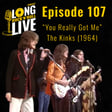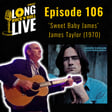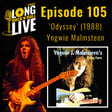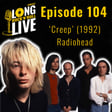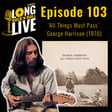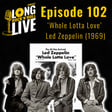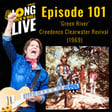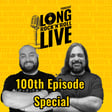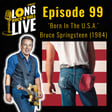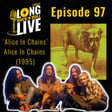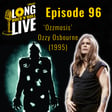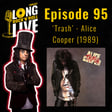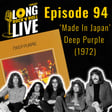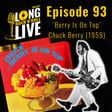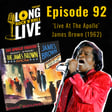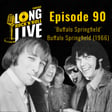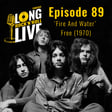Iron Maiden's Evolution and Early Influence
00:00:12
Speaker
Hello and welcome back to the Long Live Rock and Roll podcast. Following the introduction of Bruce Dickinson and his success on Number of the Beast and Peace of Mind, Iron Maiden were the ones to watch in the early 80s, progressing and developing heavy metal from its British roots in the 70s into the newly established new wave of British heavy metal that the likes of Maiden, Saxon and Angel Witch were pioneering.
00:00:36
Speaker
In 1984, they presented us with an album boasting the same musical prowess as their previous albums, but with a maturity in the thematic concept and a developed complexity in their songwriting arrangements and musicianship.
00:00:49
Speaker
Power Slave remains a cornerstone of Iron Maiden's discography and heavy metal in general, blending intricate musicianship, fast-tempoed songs, and captivating storytelling with themes of ancient Egypt, mythology, and historical narratives.
Felipe's Personal Journey with Iron Maiden
00:01:03
Speaker
Joining me to discuss this album is my co-host, Mr. Felipe Amorim. How you doing, bro?
00:01:08
Speaker
Doing great. I hope everyone is doing all right. Yeah, we heard you doing well. Iron Maiden. If you didn't, yeah, I mean, if you can hear us, we kind of told you already, but if you can see us, I mean, just look, I mean, we've got the shirt for you this week, but the literal power slave shirt. Yeah, so as you guys know. How many Iron Maiden shirts have you got, man?
00:01:28
Speaker
At one stage, I had five at once. Now I've got three because I think I grew out of the other ones. But yeah, too many. And you're going to get a little surprise as well when we get to a certain part of the show. But yeah, so PowerSlave, so my metal heads in the audience. And listen, I love when we do the rock stuff. I love the 60s stuff. I love everything.
00:01:50
Speaker
you know me when we hit metal this is uh yeah lazz is very happy today put it that way um anyways yeah let's kick off i mean as i said we're doing power slave by iron maiden just some quick fire facts for you so it was released on the third of september 1984 recorded between february and june 1984 at compass point studios in the bahamas i never knew that i never knew they recorded it there
Power Slave: Release and Impact
00:02:12
Speaker
Genre is obviously heavy metal, but if you want to get a bit more specific, this would fall into the new wave of British heavy metal branch. The length of the album is about 51 minutes, and the label was EMI, and it was produced by Martin Birch. So yeah, first of all, Felipe, I'll ask you, why did you pick this album? Because everyone might think it's me that did it, but it's not me. Felipe chose this one. Can I tell the whole story about it? Do it.
00:02:36
Speaker
Right, this album was the only heavy metal CD we had at home so my brother had this CD and I was more into prog at the time and some classic rock as well.
00:02:48
Speaker
my brother had it and I was listening to it and I liked it. I liked it more when I listen to it now, but at the time they were about to perform at Rock and Hue, so in Rio de Janeiro in Brazil, and we bought tickets, not just the Iron Maiden, because we wanted to be at one of the biggest rock festivals
00:03:12
Speaker
of all time really, because I think the night they performed was like 220,000 people or something. It's crazy like that. And I don't know which year was that, but it's about 20 years ago. 2001. 2001, so yeah. So the story is, so I put the CD on, you know, track one, Aces High, it was like, it's actually a cool song.
00:03:34
Speaker
you know what I'm going to do a heavy metal gig and I might as well just you know sing along to one song right let's learn the lyrics I've learned the lyrics I spent some time learning the lyrics for Aces High so I could just shout them when I saw them on stage that song is so cool I mean Annie was a single and probably you know the most famous song in the album I don't know it might be but so I've learned it I was prepared for it
00:04:01
Speaker
and they didn't play.
Iron Maiden's Musical Style and Consistency
00:04:04
Speaker
That's the story. I feel bad when you tell me this story. I've been lucky enough to see them play that song live. But when you tell me this story, my heart just hurts for you. There's more to it. There's a classic rock friend I've heard, right? That Jimmy Page would be there and he would perform with them, play some Led Zeppelin on stage with Iron Maiden. And I know they were influenced by him and Zeppelin. No, but he was just there to give them a
00:04:31
Speaker
I think they gave him a guitar with their autograph so he could sell it, auction it for his charity. So that was it. So he met them on backstage, not on stage. So that was my experience with Iron Maiden Live. I was kind of disappointed.
00:04:49
Speaker
but they performed a phenomenal gig as they normally do. It's not the set list you wanted. Yeah, Rose Epplin covers and No Ace is High. It's all right, it's fine. I don't know the lyrics to any other song, I'll just be here. Yeah, but okay, with that in mind, I wanted to go back to this album and listen to it.
00:05:10
Speaker
And I just remember liking that song specifically. So I said, no, you know what, I need to listen to some heavy metal for this show. We needed to do an album that's heavy enough. And yeah, that was my choice. Why don't you give me your thoughts?
00:05:27
Speaker
Oh, my thoughts. Yeah, sure. Unless you want to save it for later or something. No, no, I'll give you my thoughts. It's really impressive. It's phenomenal. I think the production is great. The sound is great. There's something about Iron Maiden that is the same with ACDC. They have a formula and their fans might not like when they go away from that formula in any
00:05:55
Speaker
shape or form. If they do anything slightly different from what they normally do, they might not please their die hard fans.
Historical Context of Heavy Metal and Iron Maiden
00:06:06
Speaker
So I think they're really good at sticking to that formula and writing riffs in a certain way, in certain tempo and vibe.
00:06:14
Speaker
And you can talk about the way they groove, the rhythm they play, the style of the riffs, the offbeat hits with the crashes and stuff. So there's a lot of elements in their music that are pretty much the same in every album. But every now and then I think they have the ability, because they're great musicians, they have the ability to add
00:06:39
Speaker
some different flavors to the album. And I think this one has got more of it than any other Iron Maiden album that I'm familiar with. I'm not really familiar with the whole discography, but I've listened to a lot of stuff with you in the car and stuff like that. And I think this album's got more of some prog rock influences and even, in my opinion, loads of bluesy guitar licks.
00:07:06
Speaker
Yeah, that's a great point. I mean, you said a lot and I'm trying to think where to start first, but the first thing you said, I'm just thinking what we do. But yeah, no, in terms of the
00:07:22
Speaker
To get an idea of what's gone on, what I'll do is I'll just give a very quick history of heavy metal up until this point. Guys indulge me, you know, I never get to talk about metal so you've got to give me my moment here. Right, I will keep it short though, won't be long. Right, so 1970, February 13th, 1970, Black Sabbath released their debut album Black Sabbath and they invent heavy metal.
00:07:45
Speaker
Arguably with the first song, but the whole album kind of encapsulates that dark. It's a hard rock out, but that's funny.
00:07:53
Speaker
whole other, whole other episode coming from this. But you know what, I'm not, I don't entirely disagree with you. So I'll say that. We'll save for another episode, but I don't- No, let's not have the argument. It is obviously the- It began it, whether it's a full heavy metal album. That's where Heavy Metal begins then. At the very least, you can say it's the first heavy metal song, the first song, Black Sabbath. Then you could say that Paranoid, six months later, kind of was heavy metal, if the first one was hard on. Anyway,
00:08:22
Speaker
1970, the first five years is the first wave of British heavy metal where you have bands like Black Sabbath, Uriah Heap, Deep Purple, Budgie, Atomic Rooster.
00:08:32
Speaker
all turning their hard rock into a slightly darker, more dissonant, more screaming vocals, more shredding guitar. That's what we're seeing. From 1975 to 1980, you've then got the second wave of the British heavy metal movement, which is where bands like, well, Black Sabbath continued, but they were doing things like adding sound effects, adding keyboards, adding piano into their song. So they were sticking with what they were doing, but just developing it a little more. But then on top of that, bands like Judas Priest,
00:09:02
Speaker
Rainbow, UFO, Derringer and even to an extent Thin Lizzy were part of this second wave of British heavy metal where they were taking aspects like the jewel lead guitars. Thin Lizzy were fantastic with jewel lead guitars.
00:09:17
Speaker
And yeah, then from 90, or I'd say from 1980, but from the end of 1979 onwards, you've got the new wave of British heavy metal, which if you, to break it down into a formula, it's traditional metal. So everything I just said in those first 10 years, plus the influence from punk, like the speed and the aggression, and you've got progressive rock influences as well in terms of the intricacies and the complexities of some of these songs. So new wave of British heavy metal bands would be Iron Maiden,
00:09:45
Speaker
Tigers of Pang Tang, Saxon, Angel Witch. There's your brief first 10 years of metal and where Iron Maiden slot in. So in 1980 Iron Maiden did their first album and they did one album a year until Power Slave.
Power Slave Tour and Band Dynamics
00:10:00
Speaker
The first two albums for listeners, what we'll do is as usual any song we mention including the album is going to be in the show notes below so you just click a link it will take to Spotify and any song we mention will be in there so you can listen along with us.
00:10:12
Speaker
I'm gonna put a song from each of the first albums in. They had a different vocalist. They had Paul Diano, who was a very kind of punky singer. And even Iron Maiden's first two albums, I don't know if you've heard any Felipe, but they're very punky, aren't they? It's still metal in a sense. It still has that darkness to it, the lyrics, the themes, but the shouting, the vocals are very punky and the speed and the aggression is very punky.
00:10:39
Speaker
Bruce Dickinson then came in on the third album, which is Number of the Beast. And I'm sure we'll do that. We'll get to that one one day. And this is where they kind of changed. And they stopped being that punk metal middle ground and they kind of just stuck it all into the metal. We're going full on metal. And that's it really. And then after that, 1983 was the Peace of Mind album and they finished the Peace of Mind world tour. Took a few weeks off and then went straight into rehearsals for Power Slave.
00:11:07
Speaker
Interesting, so he was like kind of the new guy in the band, well not really, they did some stuff with him. Well the other note I've got is it's the first album, and I didn't know this, Power Slave is the first album where they didn't go into a new album with a new lineup, so they had the same lineup on peace of mind as they did with Power Slave, which they hadn't done before.
00:11:30
Speaker
Yeah, so they worked tighter as a band, which really shows. And they would note that no one left, no one joined, no one left. They'd been on tour around the world. They did the biggest tour to date after. And I think it was still their biggest tour for many, many years. The Live After Death tour. Yes, exactly. And they released a live album, which is really good as well. Yeah, so it's a point in their careers where they
00:11:56
Speaker
they have a solid lineup after, you know, they changed the drummer, isn't it, from the first to the second album. Yeah, yeah, Nico McBrain came in, yeah, yeah, sorry, Karen. Yeah, and Nico McBrain is a really technical drummer, he's really good, technically speaking, and that means you can do a lot more, and you have a technical drummer in a band, a guy who can play,
00:12:20
Speaker
different rhythms and different styles, even with a full range of dynamics playing really loud and quiet if it wants to. If you have that, the whole band tends to improve quite a lot. So that definitely was a big change for them. Obviously changing lead singer is a massive deal.
Key Members and Their Contributions
00:12:40
Speaker
So it's a different band, really is with Bruce Dickens, in my opinion, for the first album for sure.
00:12:47
Speaker
Yeah completely because it becomes, well you're right, it becomes a different band. Paul Deanno's vocals were very punky, they were very coming, yeah you know. I don't have a question for you, can you still identify any elements of punk rock in this album? Do you think there's a little bit of it? Do you know what?
00:13:10
Speaker
In terms of aggression and speed, yes, but I can't listen to a riff and say, oh, that's a punk riff. What do you think? I see. I think so. I think for me that the... Which parts? I'm interested to hear. I think every time they play in the... I know the riffs are typical like metal riffs, but...
00:13:27
Speaker
the way the groove is played with a really, really strong backbeat and it's kind of, the groove is kind of raw sometimes. That's why I see it. I don't think is, when they grooving, I don't think it's really, how can I put it? Can I give you an example? Cause I feel like I know what you mean. I'm going to take you straight to two minutes to midnight. Yeah. Because that, that is the one note I've got where that, that the intro riff could be, to me, it sounds like a rock riff.
00:13:55
Speaker
You could have heard that from Zeppelin. It's kind of bluesy. It's not very metal. It's not dark. It's like a classic rock riff. And is that what you mean? Behind riffs like that, they just establish that backbeat. And sometimes you could, okay, there is kind of a half tempo vibe before
00:14:13
Speaker
the chorus, isn't it? The killer's breed. Yeah. Oh, then it doubles. Yeah. A normal, let's say classic rock, maybe even some metal bands could play that beat for most of the song, let's say. Yeah. That would say when you play the double tempo really fast, for me, makes me think of punk. You know, that's what it makes me think of. Ah, good. Very good point. That's part of it. But it's the way they play it. I can't really describe it. It's not like
00:14:38
Speaker
because there's something like modern metal, maybe even at that time you had loads of like double kick stuff, other drums, and Nick McBray never did that. I think he used a double pedal later. This is the Brave New World. He's the only one who did something like that. So his drumming style, it does communicate with punk, although it's not entirely punk.
00:15:05
Speaker
I've watched, I've got the DVD, the Flight 666 DVD, and you see him, first of all, he plays barefoot. I imagine that, is that useful to drummers? Just bare grip or something? I don't think it helps, not for me, no. But what he does is, you know, so...
00:15:21
Speaker
What song? In that middle section where it goes all quiet. And he's doing the kick. He only uses one foot. He doesn't go...
00:15:36
Speaker
most metal drummers do. The thing with that, for instance, if you do the double kick, you have more power, of course, because you split in that hard work for two feet, so they both sound loud. When you play more notes with one pedal, then you have those notes, they're less punchy, and they have a different dynamic to them. So it's like this slightly quieter, and that's more punk, because punk drummers would play everything with one pedal instead of two.
00:16:06
Speaker
Okay, that's interesting. That's a some drum information for you. Do you know what? Let's then let's go straight from drums to bass. Yeah, please. Because like, tell me about Steve Harris. Oh, my God. Where do I start again? Again, it is very unusual, isn't it? It is multiple things with Steve Harris. And I have to say he is my definitely top three of my favorite bassists of all time.
00:16:36
Speaker
Now, there's a common misconception that people think he uses three fingers to do a gallop. So dun,
Exploration of Iron Maiden's Signature Sound
00:16:42
Speaker
dun, and like dun, dun, dun, dun. But he doesn't, he does these because he said when he uses three, he's so, like, I didn't, it was only when we were at uni studying together, I only found this out then because I didn't realize how technical he was. He's self-taught, I believe, and
00:17:00
Speaker
I didn't think he ever cared for something this detailed, but I'll tell you now. Of these three fingers, he said these are the two I play with, I suppose if you look at it like that. And he said when you put them together and the angle he plays his bass at, this one is too short. So he wasn't getting the consistency. If he was doing three notes, he'd be going,
00:17:25
Speaker
Okay so the third note would be quieter and you actually hear every single note and he plays it. So instead of going bah bah bah he goes bam. See so I always thought he was using three fingers for everyone does everyone thinks that that's really interesting.
00:17:43
Speaker
is I can't find the video on YouTube but there is a video of him walking down going yeah and everyone thinks I play with three fingers but I don't you know this little one's too short for me I just I just alternate these two. So that's the way. In terms of his bass playing there's so much to unpack and it's really important that we unpack this because so much of it is important to Iron Maiden's sound. So I'll start off with the gallop.
00:18:09
Speaker
now the gallop this is a rhythm and for musicians out there yeah it's an eighth note followed by two sixteenth notes so if you're in the uk one quaver and a quaver and two semiquavers yes um i'll take that with my little finger picking out um so it's it's bum ba ba bum ba ba bum and that is the bass b-a-s-e of iron maiden
00:18:31
Speaker
And that rhythm, their whole career has lived and died by that rhythm and it is littered throughout the whole album. Right now, I'll just do a few. So, Power Slave.
00:18:51
Speaker
All the way through, two minutes to midnight, the killers. It's the backbone of every Iron Maiden song.
00:19:06
Speaker
Let's say 90% of Iron Maiden songs, they'll obviously do. An exception would be like Aces High, where it's just so fast. But he does another thing there, where instead of going dun dun dun, he goes dun dun dun.
00:19:19
Speaker
So... It's a variation of that gallop thing. We need you to do a compilation of your singing riffs. I want to hold one hour YouTube video there. That's the base of Iron Maiden's music. But where it lies is in the drums and bass. And so it's so important that Steve Harris is playing
00:19:45
Speaker
And you've got to consider that the guitarists are doing that with a black drum, whilst he's doing it with his fingers. It's much harder. But the columnist's conception as well, of course, of course, where it's due. Everyone thinks the gallop was like Iron Maiden's thing, but you've got to note that Deep Purple did it first with Hard Loving Man in 1970. So when next to go with Steve Harris' bass playing? Right, Melody. And this is what was so important about Steve Harris and Iron Maiden at this era.
00:20:14
Speaker
his melodic playing is just fantastic. Just think about the rhyme of the ancient mariner. Four minutes 13 and seven minutes 35. If any listeners or viewers want to stop and listen, you've got the bass taking over the song. You've got in that four minutes 13, it's where the guitar just holds a chord and the bass goes... It takes over it. And then after that, gone.
00:20:43
Speaker
Now, the same thing in Powerslave, that thing happens with Powerslave. How beautiful is Powerslave in the middle section? Because you've got to remember, it leads the band with the bass on that part and then they go into the guitar solo. These were the songs I spent hours of my childhood playing on bass and that part, the doo doo doo doo doo doo doo doo doo doo doo, unheard of.
00:21:07
Speaker
you wouldn't have heard a metal band playing or a metal bassist playing something that melodic whilst the guitars are just holding a chord. That's not metal. You know what I mean in that sense. Basically you've got to consider that you've got two like virtuoso guitar players in a band and you're going to give the lead role to the bassist in two songs. It's got to be really creative to do that.
00:21:33
Speaker
Absolutely. But then look at the duelists at one minute 50. He joins in when the guitars do the tough stuff. It's so normal for a bass player just to sit there and play the root note. Even him doing his gallop. But no, he joins in. Don't you think this is one of the strongest characteristics of this album, the fact that they play
00:21:57
Speaker
rhythmically in unison not the same notes all the time but like they play the riffs so tight together and you have the bass and the two guitars doing it really really tight. I mean there's probably more than two guitars because you can record as many as you want. Yeah so I haven't done enough research into this but I would hazard a guess
00:22:19
Speaker
that if you look at the turning points and nowadays in heavy metal, you'll have the bass playing the same riffs as the guitars in most kinds of metal. Whereas if you go back to the start,
00:22:30
Speaker
Sabbath, Judas Priest, Rainbow, Thin Lizzy, the bands, those kinds of bands, the bass playing is still, if we got a spectrum of rhythm and harmony, yeah, if you've got the spectrum of rhythm and drums and harmony and guitars, you'd expect the bass of the early metal to be here, sticking 75% towards rhythm, 25% towards harmony. But Steve Harris came in and
00:22:59
Speaker
showed how you can put it way more in the middle and split that beautiful rhythm but also figure out the harmony and join in with the guitar stuff. It's just absolutely incredible. So I want to ask you two questions actually. First off,
00:23:19
Speaker
Who would you, if listening to this album, because this album I think is the best indicator, who would you liken his playing to? If you had to guess who Steve Harris was influenced by because of his playing, what would you say? Maybe John Entwistle, maybe Jack Bruce, maybe he's a butler.
00:23:39
Speaker
I've got an answer that's my own personal thing, and this is from my studies, I haven't heard Steve Harris say it, but from having studied both bass players incredibly closely, maybe you know where I'm going now, I just cannot help but hear John Paul Jones from Led Zeppelin. Fair enough, especially the more melodic parts.
Musical Influences and Arrangements
00:23:57
Speaker
Think about that power slave middle bit and think about John Paul Jones doing a ramble on
00:24:02
Speaker
Yeah. Lemon song. Lemon song. Yeah. That groove. Yeah. But it's incredible. I mean, I think that's it. And I think I've covered the only other thing I wanted to cover on the bass playing is chords. Steve Harris plays chords. Yeah.
00:24:16
Speaker
And what you are hearing is a thicker sound, but you're not hearing anything special. You're not hearing anything jazzy. He's not putting an extra note in there to sound different. He's playing, in musical terms, the root, the fifth, and the root, which we know is a power chord.
00:24:34
Speaker
now the just more guitar players do a lot a chord is whether a chord is major or minor is determined by one note and that is the third note of the scale which is not playing he's not playing because he doesn't need the guitarist to doing that leave it to them he's just giving power with a note and the best example i can give if you if you missed him playing chords in this album go and check it out here it is power slave there's that little break where we get the egyptian part
00:25:01
Speaker
And the other thing that I will mention quickly is this exact same section, it's fantastic how they do little counter melodies. So the guitar goes... Steve Harris goes... Chords.
00:25:23
Speaker
So the guitar is playing one note at a time and he's playing. They both start on the same note and then they, you know, the guitars go higher. Steve Harris goes, duh duh. Awesome, man. And that is metal as hell, even though it's Egyptian sounding. And that brings some depth to the groove. Yeah, it's amazing, isn't it? But yeah, then the only other bass thing I wanted to touch on was to ask you, is Steve Harris, the unsung hero of this album,
00:25:54
Speaker
uh you can answer no because i'm a bass player i'm biased no yeah i think so i think he is um how can i put it how can i put this i think he's
00:26:06
Speaker
He's the one who really holds the band together because there's a lot going on. It's a really clever album in terms of arrangement structures, lyrics. You've got like an amazing singer who is one of the most famous voices in rock music. And you've got all of those things, but you need that glue that keeps everything together and the band never falls apart. And I think the bass does that job.
00:26:35
Speaker
adding the depth whenever it's needed and doing exactly the same as the guitar players when needed and doing his own melodic independent thing when needed. So yeah he seems to be in this album particularly the most versatile musician in the band. If you answered no to that question and that you didn't think Steve Harris was the unsung hero my answer would be
00:27:01
Speaker
take two songs like Power Slave and Rhyme of the Ancient Mariner, they'd be completely different without the bass, wouldn't they? Yeah. Those two songs, they have a whole section led by the bass. Yeah. Which is unusual in metal. It is, and it takes charge. But like I said, this album and this era of Steve Harris doing his thing really could have been the turning point in metal where the bassists stopped being close to just playing the root note and started getting more involved in the riffs.
00:27:31
Speaker
Yeah, amazing. Amazing. What do you want to do? Any points you want to talk about? I want to talk about two other individual members of the band. Sorry, I'm not giving enough credit to the guitar players, but I need to say that
00:27:49
Speaker
one of the essential elements of the album, probably it was happening before this album, is the fact that Nick McBring has a gigantic drum kit. So that brings him, because when you're playing guitar, you're playing the fretboard with like
00:28:07
Speaker
hundreds and hundreds of options for notes and different octaves and stuff. And a normal drum kit hasn't got that many different toms. So whilst he's got like
00:28:20
Speaker
He's got the gigantic drum kit with, I don't know, like, I think he had eight toms, you know, the big drums in front of the drum, right in front of the drummer. So you basically have the kick and snare as the essential parts of the drum kit, the core of the groove. And then you've got the toms in front of you. He's got many more of those than most drummers have, and that gives him a whole
00:28:45
Speaker
a range of sounds to choose from. So when he plays the fills, it's never boring because he can use different parts of the kit. It's a simple thing. His fills are really strong. They're not like, he never overplays, in my opinion, but he's really technical and he knows how to choose which drum to hit in the right part of the song and the sounds are never too repetitive. And the other thing I'd say is Bruce Dickinson as a singer
00:29:11
Speaker
Can I just go back to Nico and just say a great example of him using that kit is at the intro of power slave. Yeah, because he does that. Am I right? It just goes from one side to the other. I have a question for you about that. I just want to say a couple of things. Yeah, so Bruce Dickinson for me is
00:29:31
Speaker
At the same time, he is really technical and has a style. So that's the thing. So if you master your vocal technique, you might sound boring. You know, it might sound like a generic singer. And he's got total control of his voice. At the same time, when you hear
00:29:49
Speaker
his vocals, you know, it's him. So that's one of the best things about the album. And he can sound quite desperate at some point, like, you know, he's really going for the lyrics and feeling the meaning of the lyrics. And I think that's absolutely amazing. So what I want to say about that,
00:30:10
Speaker
What song would you say was it, Power Slaves? Power Slaves. Yeah, Power Slaves starts with the drum fill. Question for you is, do you think there's any influence from Rush? Yeah. Because that kind of drums, that drum sound and that kind of descending drum fill from a really high pitched drum to a lower one at that speed sounds a lot like new pH to me. That's a great point. And one thing that
00:30:39
Speaker
Yeah, the progressive aspect of this album is hugely important as well because one thing, so it's right from the very start, Iron Maiden had this idea, and again, this goes back to finding the DNA and the makeup of the new wave of British heavy metal. Part of that, you know, a lot of the aggression and the speed comes from punk, but a lot of intricate playing comes from prog.
00:31:06
Speaker
we were only talking what was the last episode of King Crimson in 1969. So Prog Rock had been in full swing for 10 years by this point before Iron Maiden even began. The best song and it's from the first album, Listers and Viewers It Will Be in the Playlist is Phantom of the Opera by Iron Maiden and you can just hear how different it is even in the first album.
00:31:28
Speaker
You can hear how much it stands out and how closer it is to this album than it is the first one. Because of how technical it is, it's so intricate, it's so difficult. The vocal line and the bass and the guitar, they all double or they're all playing together. It's very intricate. It's very offbeat, very syncopated, very unique. This progressive aspect is creeping in a lot to Iron Maiden at this early stage. They went on it a bit harder with peace of mind
00:31:58
Speaker
they sort of did it a really good job for power slave but then it goes very progressive in the next album seventh son of a seventh son so yes in answer to your question undoubtedly i think that you know with a kit that big someone must have been like you know listening to neil perk and you know doing his thing but very much the seventh son is their most
00:32:17
Speaker
Prog album. That's what I've heard from some Iron Maiden fans. I agree with that. It's much closer to Prog than what they normally do. And I think this album is well balanced. Maybe that's one thing I should have said when you ask me why this album.
00:32:34
Speaker
think there's a good balance because even if you're not a metal fan but you like rock music in general there's there's a little bit of everything there so. There is completely um the seventh sun is more progressive it's there's just one one one more difference for me and that's uh keyboards it's got a way bigger
00:32:52
Speaker
I wouldn't say Reliance because the songs still do well on their own, but there's a big, there's much more atmosphere, much more keyboard and synth holding down in the back, you know, whilst the instruments do their thing. That's the only way I'd say 7th Son tips to walk more towards prog than this one does. But you bang on here about how balanced it is, and something about the balance
00:33:14
Speaker
is as I said it takes the traditional metal aspects but it also sort of works in some of the punk stuff and also the progressive side. Now of the traditional metal, one thing this album is littered with and that is just done so beautifully is dual lead guitars. For people who don't know what that means you can hear it, it's where one guitar plays and another guitar is playing the same, to an extent the same rhythm
00:33:41
Speaker
and to an extent the same melody, but they're playing it in a harmonised way. Just like vocal harmonies. Yeah, that's playing the same thing, but a different note, a note that complements the root note, if that makes sense.
00:33:59
Speaker
and all the way through man I mean it's just incredible loss for words you've got it at two minutes 34 the dualists you've got them at one minute 50 and 415 and I just find Felipe they're all just such beautiful simple melodies
00:34:17
Speaker
That's what I love about this, this album especially, is that there's nothing, you know, forget that the dualists is quite intricate and Lost For Words is instrumental, so that is intricate in its nature. They're trying to show off more the instrumentation because there's no vocals. But everywhere else in the album, when you hear those guitar melodies, they're just so simple. It also reminds me of classical music.
00:34:43
Speaker
Just how simple it is. Yeah. It's almost like designed to be whistled or, you know. Exactly. Yeah. I just got there. There's so many fantastic moments in there. I mean, and jewel lead guitar, jewel lead guitars are a characteristic of heavy metal, especially in the early days, anywhere between, I don't know, 1975 and 19, even up until the end of the nineties, that was a staple characteristic.
00:35:09
Speaker
And one important aspect of that is to
00:35:15
Speaker
play them really tight together. So when you see them playing live, do they still have three guitars? They do, yes. And you see the three guitars doing that thing. It just sounds beautiful. It's like a small orchestra, isn't it? I like that. Yeah, it is. And they do, I mean, but there's some of them. Which song was it? I think it might be.
00:35:42
Speaker
Oh no, do you know what it is? The Flash of the Blade. You know that part with the hits and you've got double dual leads. Sorry, go on. And the guitar intro sounds very much like classical music to me. So that's another thing in the album, you can hear classical music a little bit more. Absolutely.
00:36:01
Speaker
with that section I'm talking about with the double jewel leads you've got the it's when the hits come in so you've got and then the harmonizing one of that so that's two guitars and then you've got the guitars going wow wow
00:36:15
Speaker
Wow, wow. And then the other one of that, so you've got four guitars. What I find interesting about that is it's like they have an instrumental section in the song. There is not a solo. It's not a guitar solo because a guitar solo is like a guitarist goes and does whatever he wants to do in the key of the song most of the time. And in metal, you can just shred all the way through and it's totally acceptable for the style.
00:36:43
Speaker
But what they just don't know, we don't want to just shred. We don't want to just like play random notes. We want to tell the story. We want to harmonize it. So it sounds to me more like arrangements than solos. That's why I really like it. Great point. It's playing for the song, isn't it? It's not a solo because you're not even playing on your own, isn't it? It can't be because it's a solo. Yeah, it's for the song. Now, something you mentioned at the start that I wanted to touch on, and it applies to Flash of the Blade and Ryan of the Ancient Mariner, hits.
00:37:11
Speaker
which is quite unusual in metal. So in Flash and the Blade, you've got the da da da da da da da da da da da da da da da da da da da da da da da da da da da da da da da da da da da da da da da da da da da da da da da da da da da da da da da da da da da da da da da da da da da da da da da da da da da da da da da da da da da da da da da da da da da da da da da da da da da da da da da da da da da da da da da da da da da da da da da da da da da da da da da da da da da da da da da da da da da da da da da da da da da da da da da da da da da da da da da da da da da da da da da da da da da da da da da da da da da da da da da da da da da da da da da da da da da da da da da da da da da da da da
00:37:40
Speaker
if you slow it down you can hear even a little bit of Freddie King in it. I'm sure there is some influence of classic blues in that. And also all the times that they slow down and they play the quiet, proggy kind of parts, the guitar is more about feeling than
00:38:02
Speaker
than technical loads of notes, which is more characters of metal. You're normally impressed by guitar players in metal when they play fast. And in this case, they don't do that all the time. So that is so that you have some some bends and some some choices of notes that sound very, very bluesy to me.
00:38:23
Speaker
Any notes, any specific songs, I think, well, it's here. It's here. Oh, yeah. Two Minutes to Midnight, the guitar solo. Yeah. Yeah. Yeah. There's a bluesy approach to it. Yeah. That's a great point for the second part. And I think even like, yeah, I'm not entirely sure the background of Dave Murray and Adrian Smith, but I'd be very from my limited knowledge of the guitar.
00:38:48
Speaker
but from what I've read and heard, I think they are quite bluesy players as in they often stick to pentatonic scales. You know, you've got people like Richie Blackmore who five years before this was doing his thing with Rainbow, sticking all sorts of classical scales in there. You know, he was a very neo-classicist. He loved the classical music. So he would put in anything you can guess. Having said that though, I did look in Power Slave, they are playing
00:39:16
Speaker
an A Phrygian. It's from a harmonic minor, yes, because I think the whole song's in D harmonic minor, but they're playing a particular mode, which is the A Phrygian dominant. Do you remember when we had to learn that in uni and all the drummers, all the drummers were at the back, like, why do I need this? I've learned that before uni and I forgot, and I've learned it at uni and I forgot.
00:39:37
Speaker
Useless information for a drummer. Now, what was I going to talk about? The one thing... Do you know the other thing? Going from chord one to chord four.
00:39:53
Speaker
Aches high in the reverse. Yes, you got move into fire at the mainstream of bombers. Then it goes up. Bandits are chasing and dancing. That's the class answer number one. Flizzy bar of a blues song. You play four bars on the first chord and then you go and you go to the fourth bar.
00:40:12
Speaker
to the fourth chord on the fifth bar so that's a classic blues progression isn't it interesting it's something i never um which is also rock and roll they probably got that uh also from like early rock and roll you know yeah Larry Elvis
00:40:27
Speaker
I never even dreamed. You guys have to remember, this is one of the first albums I ever listened to. Not just metal, ever. So for me, this is just all I think when I see this album and hear it is heavy metal. Because it's always been meant so much to me just as an album before I ever got educated about music, I've never gone
Iron Maiden's Unique Position in the Music Industry
00:40:50
Speaker
and been like oh yeah I hear blues there or I hear classical there so doing this has been incredible man because it's really just kind of opened up even just a new um just a new
00:41:02
Speaker
and you went for me. Do you know one thing I do want to talk about was the pace of the album. Yeah. Because it's fast, isn't it? Check this out. The album, so eight songs, an average tempo of 154 beats per minute. That's the average. Do you know what's the fastest tempo? I had it googled. I'll go and check it out now. That's quite fast. Yeah.
00:41:27
Speaker
As an average, like that's nuts. Here we go, so I've got it. Is it this one? Yeah, I'll find my way through it. Yeah, I'll click it when we're next talking about something so that we don't leave them hanging. Now my question, and this is a big point I wanna discuss. Why do you think, and I'll make an argument afterwards
00:41:56
Speaker
Why do you think this album isn't more famous than it is? Sorry, I'll make it a bit more specific. What is inaccessible to other people in your opinion about this album? Oh, that's tricky because I, to be fair, I didn't even know that this wasn't one of the
00:42:15
Speaker
one of the best-selling albums, isn't it? I don't know. Well, no, you're right. But I mean, in general, Iron Maiden is still, oh, yeah, a Maiden, that heavy metal band. Well, I think as the genre itself, it's not them as a band. The thing with them is I think they never bothered being like mainstream or being a
00:42:36
Speaker
loved and appreciated by anyone but their loyal fans. I'll tell you that because I've seen an interview, I don't know if it was the manager or booking agent, someone who works with, I think the manager, and someone asked him, so how did you guys survive all the changes in the music industry? Something like that kind of question said, I do not work for the music industry, I work for the iron maiden industry.
00:43:02
Speaker
And that is, that is, yeah. How rock and roll is that? You've got to give her a number, come on. What would you say? I work for the Iron Maiden industry. Well, if a band's trying to make their way in the world,
00:43:18
Speaker
And people are offering them help and saying, oh, you've got to do it this way. But he says no, because he's all about his own band's industry. That's an 80 out of 100. That is rock and roll. Well, it is insane. When you think about it, that means they understood that they were not for the masses.
00:43:36
Speaker
Although they sell millions. Interesting, isn't it? It's like if you're not a music fan, if you're not really into well-written music, well-played music, if you just want to listen to all the radio stuff, then you're never going to listen to Iron Maiden, which is fine. And they never wanted that audience. They're like,
00:43:56
Speaker
We play for people who appreciate music. And as the guy said, it's the Iron Maiden industry. So it's not the music industry. They have their own parallel universe. They do their own thing. And regardless of whatever crisis might be going on with the music industry, it would never affect Iron Maiden.
00:44:17
Speaker
That's a very, very good point. And they've always, I mean, we, we watched several times when we were on tour, we watched that. Oh, you were with us. We watched that flight 666 documentary. Great. Yeah. It's amazing. And they are just so self efficient. Is that as a phrase that they're self, they do it all themselves and they don't need anything else. They, they've become a business in and of themselves. They don't rely on anyone else.
00:44:39
Speaker
Yeah, and it's like, well, we need to have our own airplane and maybe the lead singer can fly it. So just we can get to every place where we need to be. When we want to. Yeah, little did Steve Harris know when Bruce was auditioning in 1982 that the pilot section on his CV would come in handy. But I want to argue, argue. I want to present an argument to you because something that has struck me
00:45:10
Speaker
it's always shocked me because again this album won the first I ever heard I never gone back and analyzed it just how accessible this album is in my opinion and I'm well I'm giving this opinion with rose-tinted glasses because I love metal agreeable chords and progressions for the most part although we said about heavy metal being dark and dissonant and a bit gloomy I just
00:45:37
Speaker
I'm hearing these choruses for eBay. I'll just go through the songs. Ace is high. That's agreeable. That's pleasant. Live to fly. Major chords. Fly to live. Yeah, that's the song I wanted to sing along to. Sorry, am I rubbing it in now? Two Minutes to Midnight. Anthemic. Sing along. Two minutes to mere happy chords. Not sad. Flash of the Blade. That's the happiest of them all. Yeah.
00:46:04
Speaker
um back in the village power slave not so much rhyme well rhyme of the ancient mariner the chorus it's a dark song but the chorus itself is is happy and well when i say happy i mean you're hearing major chords you're not hearing chords or notes there
00:46:18
Speaker
you know, not working with each other. Bruce is singing, apart from, you know, the old scream here and there, he is enunciating his words perfectly. He's singing almost classically. Yeah, to the point, one thing I noticed in that song, Back in the Village, that is a really, I want you to listen back to it when I have the chance, because there's a really interesting rhythmic effect with the vocals. He sings like some long notes on top of a fast groove,
00:46:44
Speaker
So it makes you feel like the melody is slower than the song. Because it's over. It's just the notes are long, so it takes longer for him to develop the whole phrase, the whole line. So he's singing long notes on top of a fast groove, so it does sound like he's slower, but as I said, you can hear every single word. Are you talking about the chorus of that song?
00:47:07
Speaker
yeah i think i don't know which part yeah that one yeah that's it doesn't that make doesn't that make the song singier yeah so that's my question yeah why has this okay i'm just going to give examples pink floyd a progressive rock band who every other album that isn't dark side of the moon is probably too much for some people yet dark side of the moon became the famous one
00:47:32
Speaker
Let's go with maybe Guns N' Roses, you know, a bit nuanced, every album except Appetite for Destruction, which everyone seems to love. Why is Power Slave not part of that? Everyone's got a copy of Power Slave, because to me, when I'm sitting here talking to you about it, apart from the pace, some of the darkness in Power Slave, the length of the song Rhyme of the Ancient Mariner,
00:47:58
Speaker
I can't see why anyone would dislike it. And that's massive bias from a metal fan, but try not to do that. It's like why people don't like the same stuff as me. I just realized how that sounded. Why isn't everyone an Iron Maiden fan? I just realized how they came across. You know what I mean, but... I think Heavy Metal itself will never be
00:48:26
Speaker
would never be the music of the masses. I don't think it can be. I don't think it's designed to be. I don't think it should be. Do you think Dark Side of the Moon is? Well, yeah, Dark Side of the Moon is because it's light. The thing is the heaviness of it. Because I think, to be fair, even for me, I'm not a metal fan. I think you reach a certain level of heaviness like Led Zeppelin. Some people already find that too much.
00:48:54
Speaker
or even AC-DC. If you go beyond that, regardless of everything they did creatively in this album, it's still a metal album, it's still heavy in its majority and fast.
In-depth Analysis of Key Tracks
00:49:08
Speaker
The other albums you've mentioned, they have slow songs. So what you have is like in two songs you have a slow
00:49:17
Speaker
atmospheric kind of section but not a whole song. They don't have ballads, they don't have slow songs, they don't have anything like that. So I think it's basically saying we don't need to do anything different, this is all we are as a band. And I think if metal became something so accessible it wouldn't be metal would it?
00:49:39
Speaker
I'll just accept and not everyone likes Iron Maiden as much as I do. Okay. But no, no, it's a great point. They really haven't heard enough of it, right? Well, I put a question here under my accessibility notes. I put, does the fast pace put people off? And I wonder if it does because it's just, how can you keep something up for that intensity? And actually going back to it, this brings us nicely round. I found the tempos. So ace is high, one, two, nine.
00:50:04
Speaker
two minutes to midnight 192, lossful words 155, flash of the blade 222, the dualists 160, back in the village 132, power slave 137 and surprisingly although
00:50:20
Speaker
Yeah, not unexpected. Rhyme The Ancient Mariner is the slowest at 1.1.2 and actually made a note of that. Most of those songs have more than one BPM as well, isn't it? Well, yeah, they change and they'll go half-time. Talking about the fastest tempo in the song or the average. Yeah, you're probably right. Still really fast.
00:50:37
Speaker
Let's talk about Rhyme and the Ancient Mariner because there's a few things we can talk about. A few first points I want to get off. The whole base of the song, as in B-A-S-E, is the gallop. Did you notice that? Whenever it ventures off into something progressive. So it's the whole base and the whole base. You know when the A.I. does our
00:51:00
Speaker
our captions. It's going to screw around with this, it's going to say bass instead of bass and it's going to say bass instead of bass. So we just have to accept it. The whole base of the song is on the gallop. Whenever we branch off somewhere and go a bit progressive or go to that narrative section, we always bring it back.
00:51:18
Speaker
And I actually love that it's the slowest song on the album because that stability, that slow speed really just holds it in there, doesn't it? It locks in. And no matter where else you go in that song, or 13 and a half minutes of it, when you get back to that, you're like, yes, I'm back home.
00:51:37
Speaker
Yeah, and you have the bass leading the quiet part. Let's put it like that again. And for me, there's this kind of psychedelic 70s vibe on that middle section. And I find the precision of the harm, it's insane, the way they really lock into that. And it's just... Sorry. I want to ask you about the lyrics, man. The lyrics, yeah.
00:52:03
Speaker
Yes, I do. Yeah. So the lyrics are it's based on a what they call an epic poem because it's not an epic poem. It's a longer poem by a gentleman called Samuel Taylor Coleridge. And the poem is called Rhyme of the Ancient Mariner. Do you know the story?
00:52:20
Speaker
Not the whole story, but I know just the start of the song, not the original. Well, this is the end of the song is most of the story. So for anyone who hasn't listened to the song yet or focused on the lyrics is a mariner, a man who sails the sea, who shoots an albatross that's flying over the ship or something because he thinks.
00:52:42
Speaker
What does he do? He thinks it's a bad omen. So he takes the albatross and as a sign, as a superstition, he wears it around his neck.
00:52:51
Speaker
But then the sailors, they're all like, no, no, you can't do this because it's bad luck. And then something happens. Again, I did read the poem a few years ago, but I can't remember how it goes now, but they go into unsafe waters and one by one, the crew is picked off and killed. Not like by, I don't think it's like a spirit going around and I think they just die of disease, but it is the curse of the albatross has come and it's picking the sailors off one by one. And then it's just the mariner left.
00:53:21
Speaker
and yeah I can't remember the last few lyrics but something about a wedding so I think he's on his way to this. Yeah so basically he goes to someone's wedding and he's telling this story. I've actually got it here because I found this just like... Amazing yeah go on tell us. So beautiful the lyrics
00:53:39
Speaker
So the mariner is bound to tell of his story, to tell this tale, wherever he goes, to teach God's word by his own example, that we must love all things that God made. So basically he's so grateful for being alive. Literally everyone in the ship died. Do you have the lyric after? Because that's my favorite lyric of the whole song. I'll tell you it, the wedding and the wedding guests are sad and a wiser man.
00:54:08
Speaker
So at the wedding now, because of everything he's been through, is a sad but wiser man. Amazing. Isn't that incredible? What song writing? I really find this, and it's such a great ending for an album, because one thing I found is, the other lyrics that really fascinated me, the lyrics for Power Slave, and
00:54:36
Speaker
Can you can you tell me what it's all about? Because I want to make sure I'm not talking shit. Oh, well, do you know what? I'm a bit I don't want to say it looks like it's a powerful man who realizes he's going to die. Right. So no, I think it's it's about the gods. So I'm pointing that screen. It's an Egyptian God. Yeah. So I think this man you're talking about is an Egyptian God, if I'm not mistaken. Yeah. But it sounds like is
00:55:03
Speaker
powerful, but he's going to die. So there's a point. Yes, the lyric, slave to the power of death. Yeah, exactly. And then there's a part where he says, so bring me the blood and red wine for the one to succeed me, for he is a man and a God and he will die too.
00:55:21
Speaker
So that song for me is about mortality. It's about the fact that it doesn't matter how powerful you are, you will die like everyone else. And that's such a great thing in lyrics, which is kind of sad, the way they put it. It's a bit of a desperate man thinking, you know, I have power, I'm a god, but I will die.
00:55:42
Speaker
Yeah. And it's like, and, you know, I don't know if he's a God or actually like a king. I could be, I feel like maybe, and I apologize if I'm wrong, you might have read some wrong lyrics because I think it says,
00:55:55
Speaker
for he is a man, not a God, and he will die too. Sorry. No, no, you can't be right. Because that's from Spotify. I just assume Spotify is correct. Maybe my interpretation was, as you said, you know, that you can be the most powerful man in the world. I always imagined
00:56:13
Speaker
that we're talking about the pharaohs of Egypt because of the album cover. So you're saying to me that you've got this pharaoh, he's got all the wealth, anything, and he's ready for whoever to succeed him, but he's still a man and he will die. And the person who comes after is going to die too. So it's like this sort of mortality unites us all, isn't it? And which is a really heavy metal kind of symptom, you know, talking about death. So I think what I found about this album is
00:56:39
Speaker
So you have the power of slave, this powerful man who is, he's a slave to death. That's the whole concept. That's the lyrics, slave to the power of death. Yeah, exactly. I rule over everyone, but I'm a slave to death. So how, how amazing is that? Like, so you think he's got slaves there, but he's also a slave to death to something. There's always something bigger than you, right? If it's not a person, it's not a king, it's going to be death itself.
Power Slave's Legacy and Influence
00:57:04
Speaker
So that's pretty cool. And then, so you have this man who's kind of,
00:57:08
Speaker
facing the darkness, which is, you know, realizing the mortality is for everyone and he's going to die. On the other end of the story, you have the mariner, you know, in the last song of the album, who is actually really grateful for being alive.
00:57:28
Speaker
So you have one man cursing the possibility of death and have one man being thankful for being alive. Bro, that's brilliant. And I'm a bit embarrassed here because my top three Iron Maiden songs, Power, Slave and Rhyme of the Ancient Mariner are two of them. And I never even made that connection. Yeah, no, awesome. That's a great fine man, honestly. It sounds to me like it goes full circle, like Power, Slave is a song about
00:57:58
Speaker
death after a life of, can I put it? Well, life of wealth and power. And the ancient mariner is after facing death, you survived. So after all the struggles, you are alive. So it's two different sides of the same story. I'll put it like that.
00:58:23
Speaker
Brilliant. Excellent. Did you have anything else you want to say? I have. You know what I have? I have Felipe Short Monologue. Felipe's got one. Hold on. Let's do them together at the end. I just got one more point, which is just to say that the influence and success and legacy of this album was huge for Iron Maiden because this is the album. And again, I said at the start, I think the fact that they've had no one leaving, no one new coming in.
00:58:47
Speaker
the first time in their career going from the fourth to the fifth album with no band lineup changes and coming from a long tour meaning that they had the time to sit and properly work on these songs.
00:58:58
Speaker
It solidified Iron Maiden as one of Heavy Metal's leading bands. And you have to remember, the early 80s was huge for Heavy Metal because the early 80s is when you have those first 10 years from 1970s to 1979 where it was all very constricted. After that, it showed anything could happen. You got Doom Metal, Thrash Metal, Power Metal, all branching off at the beginning of the 80s.
00:59:23
Speaker
Iron Maiden and for me in my opinion this particular album kept that traditional heavy metal feeling going and it really did solidify them as one of the most important bands. This album got into the top 10 in seven countries, Netherlands, Finland, Germany, Norway, Sweden, Switzerland and the UK. That's a massive thing in the 80s
00:59:47
Speaker
whilst you've got glam metal going about, you know, ruining things for everyone. If you're a metal head, if you're a metal head. Because seriously, I'm just I'm kind of regurgitating what other people have said, really, because that's why thrash metal came about because glam metal became too popular. And you're like, metal heads were like, what the fuck is this?
01:00:11
Speaker
What are you talking about? What are you looking at? So that's why people like, you know, the underground bands like Slayer and Metallica and Testament, they rose up because metalheads were like, well, I don't want to go and watch these lot. I'm going to go and watch these lot. And I think Maven are a part of that as well. Just another band that people like, yes, keep heavy metal strong.
01:00:29
Speaker
So yeah, all good. Do you want to do your monologue? Yes, I will, because, you know, this is very rare. I get one once a week, so it's a bit normal. Mine is always, my monologue is always like a shorter version. Oh, perfect. I can't wait. Let's go. Let's go. All right. Arrowmaiden put together a masterpiece of heavy rock that combines individual musicianship with solid grooves and guitar harmonies.
01:00:51
Speaker
The theme of war and death can be found in pretty much every song, but the whole journey ends with the message of survival and gratitude. Mortality, fear and darkness are poetically sung by one of the most recognizable voices in the history of rock music. A few added elements of Prog and Punk make this album much less predictable
01:01:10
Speaker
the most records of the same genre. I would highly recommend this particular album to any listeners who want to dive into the heavier side of rock music, but are still not familiar with Iron Maiden. That's amazing. That's beautiful. This is like one perfect paragraph summing it up. That's amazing, bro. That's how I felt about the album. I'm really happy to have listened to it a couple of times over the last week.
01:01:34
Speaker
Now we, before I do mine on log, there's one thing we forgot to talk about and I'm just going to change things up a bit. What is that? Because it's the album cover and the vinyl. You actually got the, oh come on. Well, I've got something better. So, um, yeah. I know what you've got. I know. I know what you're going to talk about. Well, this isn't the drumstick.
01:01:58
Speaker
Oh no, I can't believe it's downstairs. No, it's downstairs. No, I'll give you the shout out because it's the best one of the best gifts anyone's ever given me. Felipe gave me as a gift, the drumstick that Nico McBrain used at the Rock and Rio gig.
01:02:14
Speaker
which so that's the part of the story I didn't tell at the beginning because after all the disappointments we had like the you know Jimmy Page wasn't there with them they didn't play aces high uh Nico was just throwing sticks in the audience and there was a there was a this camera moving about
01:02:31
Speaker
And one of the sticks just bounced into the camera and just went flying over everyone and just hit my brother in the belly. So he just grabbed it and put it inside his shirt because everyone was fighting for drumsticks. It was like, I've got it. Let's go. Let's leave.
01:02:50
Speaker
So that's the story of the drumstick and where is it now? It's hanging up in the living room downstairs so it's nailed up sitting there perfectly so I didn't forget about it I was going to bring it when we did just an Iron Maiden in general episode but I've got this one so the thing that's special I mean first of all the album cover I mean do you know this might be and it probably is my favorite album cover of all time
01:03:14
Speaker
It's 100% my favorite metal album cover, but just in general, I mean, look at that, man. I just think to come up with something like that, it's just incredible. But this is a 30th anniversary limited edition. Oh, look at that. Which comes with. You're showing off now. A picture vinyl. Oh, wow. So that is the Aces High artwork that you can see behind Felipe. And then the two minutes to midnight one on the other side.
01:03:45
Speaker
Oh, brilliant. So, yeah, I mean, man, it's not often we have we do shows of vinyls I have.
01:03:51
Speaker
So I had to show off this time, but we did, I had King Crimson last time, didn't I? So yeah, it's becoming a bit of a theme or maybe that's why I'm picking these albums. Yeah. But yeah, anyway, fantastic. Right. Well, we'll end up with, we'll finish up with my monologue then, but you didn't actually say what you thought about the album cover. Do you like it? I loved it. I loved it. I think it's so striking, isn't it? It is, it is. All the album covers are great, but this one in particular. Yeah. Yeah. This one is really, really cool. Excellent. Right.
01:04:22
Speaker
I'll do you my monologue and it's actually, you believe it, it's not my longest one so yeah, we'll get through it.
01:04:29
Speaker
So as most of you know, heavy metal is my favorite genre. And for me, there are only a handful of albums that I feel encapsulate metal perfectly from start to finish. Power Slave is one of them because it takes, excels and enhances everything that Iron Maiden and metal in general had done up to that point. You've got stunning melodies being battled out between the jewel lead guitars in nearly every song with beautiful simplistic motifs harmonizing with each other.
01:04:56
Speaker
You've got eccentric, progressive and intricate solo sections, like the middle part of Two Minutes to Midnight and the middle part of Power Slave, where dynamics and tones are switched up and played around with to take the songs to the next level, as well as the solos themselves being complex and difficult to play, yet so nice to listen to. You've got blistering pace throughout with an average tempo of 154 beats per minute, each song full of energy and speed, really creating a simple yet effective sense of excitement
01:05:25
Speaker
that hurtles you through the album. You've got standout individual performances that don't quite qualify as virtuosic, but has each member doing their job superbly. Powerful vocals, stunningly versatile bass, great guitar tones, riffs, and solos, and excellently consistent drumming. You've got artwork that is so visually striking and powerful, yet so different from their other. It's possibly my favorite album artwork of all time, and it's one of those pieces of art that I symbiotically associate with each song
01:05:55
Speaker
enhancing and making the experience even better. Now for the most two important points, you've got accessibility in agreeable chord progressions, sing-along melodies, anthemic choruses, simple rock riffs like the two minutes to midnight, with a lot of consonant and agreeable sounding music.
01:06:13
Speaker
You've then also got darkness and metalness coming through in the lyrical themes, certain musical passages like the verse of Flash of the Blade, certain scales chosen like Power Slave and Two Minutes to Midnight, heavy tone of the guitars and the drums,
Closing Remarks and Engagement
01:06:28
Speaker
and the fast jarring pace of the songs. And this is what for me makes the album so good and so rock and roll. The complete freedom to explore these almost contradictory musical characteristics, but structure them and piecing them together in a way that just works so well. It's a hugely significant album for Iron Maiden. It truly feels like they cemented their sound and their style properly with this album. It contains two out of my three favorite Iron Maiden songs.
01:06:56
Speaker
And there are easily three or four others from Power Slave that could make my top 10. It's a cornerstone album in heavy metal history and deserves to be celebrated as such. Well said. Lovely. And with that comes the end of another episode. We hope you've enjoyed being with us today. Felipe, any last points or you all good?
01:07:17
Speaker
Oh, just please follow, subscribe, give a like and all the all the virtual things you're supposed to do when you like something. You did my job for me. That's brilliant. Thank you. I said, you know, you know, the thing, you know, you know, the drill every every person presenting any online show is going to be say, well, you click on that button here or there, you know.
01:07:38
Speaker
All the online stuff that's going to make the algorithm likes us a little bit more. Because the algorithm loves us anyway, because we're really handsome. But yeah, so just click on everything. You can click and share and comment and give us five-star reviews, please. No, not four and a half. Give us a proper five-star review. TrustPilot and whatever. Hold on. We're not providing a service.
01:08:08
Speaker
Don't do us on TripAdvisor, please. Not TripAdvisor. All that kind of stuff. Yeah, Google reviews or whatever. Anyway, thanks for being with us. Keep on rocking everyone and don't do anything I wish to. I echo everything you said.
01:08:26
Speaker
but keep it to spot via YouTube and that will help us most. You can give us an Airbnb review if you want. Anyway, right, you take care, guys. We'll see you next time. And as usual, long live rock and roll.

